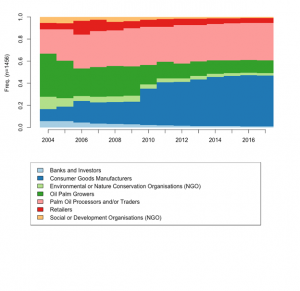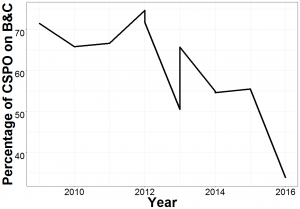By Kristjan Jespersen & Caleb Gallemore.
Approximate reading time: 3-4 minutes.
Go to any supermarket and you’ll see labels, so many labels. Some of them seem reputable: the Marine Stewardship Council, the Forest Stewardship Council. Some of them seem less so, such as Bob’s House of Sustainability standard, which we just created five minutes ago.
One challenge – countless standards
Credible or not, these standards, developed mostly by the private sector and civil society, are growing in number. In Jessica Green’s 2014 book, Rethinking Private Authority, she counts 119 such environmental standards as of 2009, 90% of them created after 1990 – and this without considering Bob’s House of Sustainability. In a way, all these standards attempt something economist Ronald Coase imagined virtually impossible: to convey information about the true social costs and benefits of actions via pricing mechanisms. In this way, complex social and ecological interactions could be made intelligible to stakeholders like customers at the corner store.
The Roundtable on Sustainable Palm Oil – A Case Study
So how are such illustrious standards as Bob’s House of Sustainability put together in the first place? Like James Scott in his 1995 book Seeing like a State, we are interested in how social systems require the production of certain kinds of information. But we suspect that because the pressures on private standards for sustainability are different from the pressures on state governments, the types of phenomena standards make intelligible will be different. In other words, we are interested in what it means to see not like a state, but like a standard, using a detailed case study of the Roundtable on Sustainable Palm Oil (RSPO). Working with support from Copenhagen Business School’s Governing Responsible Business Research Environment, we are in the process of collecting data on the internal processes of the RSPO from a range of sources that include webscraping, document analysis, and interviews.
Various Adverse Effects of Palm Oil Production
There are certainly plenty harrowing problems posed by palm oil production that ideally should be readily legible to consumers: palm oil production causes deforestation and attendant greenhouse gas emissions and biodiversity loss, particularly affecting orangutan populations. Because land clearance to plant oil palm often is undertaken with the use of fire, it contributes to local air pollution and the notorious Southeast Asian haze problem. What is more, oil palm plantations often engage in exploitative labor practices, promote tenurial conflict, and can benefit local elites at the expense of others.
Lead by conservation and social justice NGOs, there have been numerous brand attacks against unsustainable and exploitative palm oil production. These have lead to such notable episodes as the successful campaign by two American girl scouts to get the manufacturer of Girl Scout Cookies to purchase certified sustainable palm oil, and the recent awareness campaign launched in Denmark by Freja Bruun, also a successful teenage environmental activist.
Reputation is Key
The founders of the RSPO intended to respond to these challenges by managing a private standard certifying sustainable palm oil production. Because initiatives like the RSPO are private rather than public, decisions about what information needs to be made intelligible are driven primarily by branding concerns. The RSPO’s reputation is critical, as it is the validity of the standard that allows it to differentiate itself from the likes of Bob’s House of Sustainability. While there have been vociferous debates about the RSPO’s on-the-ground requirements, another key concern is the traceability of certified palm oil across the supply chain. Within the standard, certified sustainable palm oil prices tend to be differentiated by the level of traceability, ranging from the Book & Claim mechanism, which acts like an offset, to the RSPO-Next system, which envisions traceability to the source plantation.
Shift in Power Balance within the RSPO
Working with several Master’s students at CBS, we have found that the RSPO has, over time, undergone a noticeable shift in the balance of power between upstream members (consumer-goods manufacturers, investors, and retailers), and downstream members (oil palm growers and palm oil refiners), as the number of downstream voting members has grown considerably (see Figure 1).
 Figure 1: Composition of RSPO membership, by year (RSPO Website Data). Credit: Mikkel Kruuse and Kaspar Tangbaek.
Figure 1: Composition of RSPO membership, by year (RSPO Website Data). Credit: Mikkel Kruuse and Kaspar Tangbaek.
As downstream members have become a stronger bloc, the RSPO’s intelligibility efforts have shifted from on-the-ground impacts to the traceability of the supply chain. While separate, traceable supply chains have been a stated goal since the RSPO’s founding, a noted shift is apparent. The share of total certified sustainable palm oil sold on the offset-like Book & Claim (B&C) system, for example, is declining rapidly (see Figure 2), and even B&C’s name has been rebranded to PalmTrace.

Figure 2: Percentage of total RSPO CSPO sold via the B&C system, by year (RSPO, various years).
Benefits of RSPO Membership only so good as the Label
Faced with concerted brand attacks, downstream members of the RSPO, in particular, have to overcome a public goods problem. The benefits of RSPO membership are only so good as the label, and downstream firms are understandably nervous about buying from suppliers who are cheating, exposing them to brand attacks. Faced with that risk, raising traceability requirements is one straightforward way to maintain the brand’s integrity. While enhanced traceability encourages downstream firms to police their supply chains, and geographic information systems and remote sensing are making traceability more robust, there is a monetary and policy cost to cutting through the supply-chain haze. The more traceable tiers of certification – which, with the exception of the newly minted RSPO-Next, do not involve more stringent on-the-ground requirements – are prohibitively expensive for smallholders and small businesses that must push those costs onto consumers. The desire for intelligibility, in other words, can strengthen standards, but has its own costs: first, it may focus intelligibility efforts in unproductive directions, and, second, when being intelligible involves transaction costs, only bigger players have the wherewithal to stand up and be counted.
Kristjan Jespersen primary research focus is the growing development and management of Ecosystem Services in developing countries. Within the field, Kristjan focuses his attention on the institutional legitimacy of such initiatives and the overall compensation tools used to ensure compliance. He has a background in International Relations and Economics.
Follow Kristjan on Twitter.
Caleb Gallemore is an Assistant Professor in the International Affairs Program at Lafayette College. A geographer by training, Caleb’s research focuses on land-use teleconnections and international environmental policy and politics.
Pic by JAM Project, edited by BOS.
